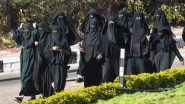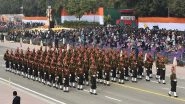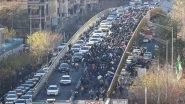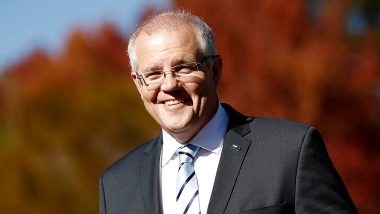Melbourne, January 6: Australian Prime Minister Scott Morrison on Monday announced an additional 2 billion dollars over two years to a new agency to coordinate a national response to rebuild communities and livelihoods following the deadly bushfire crisis. The National Bushfire Recovery Agency, headed by former federal police chief Andrew Colvin, will help bushfire affected communities recover.
The agency would be funded with an initial 2 billion Australian dollars (USD 1.38 billion) to ensure the families, farmers and business owners hit by the unprecedented bushfires would get the support they needed as they recover, the Prime Minister said. "It's a long road ahead and we will be with these communities every step of the way as they rebuild," Morrison, who is facing widespread criticism in Australia for his handling of the crisis, said. Australia Bushfire: Thousands of Holidaymakers Trapped on Beaches Encircled by Fire.
The bushfire crisis has taken a very heavy toll with more than 1,500 homes already lost throughout the course of this fire season, which has been running since September, according to the government. Over 20 people have lost their lives so far.
"While the immediate focus for our emergency services and the Australian Defence Force is keeping people safe and defending against the fires hitting so many areas, we also need to be ready to hit the ground in communities where the fire-front has passed to help them rebuild.
"The agency will ensure the work of state and territory governments is being supported and act as a 'one stop shop' central team to coordinate the response. We will do whatever it takes," he said. Meanwhile fire continued to burn across several regions of the country including New South Wales and Victoria which on Monday received some relief following rain.
Commissioner of New South Wales Rural Fire Service Shane Fitzsimmons confirmed that nearly 150 fires were still burning across the state. "We are certainly seeing an easing of conditions right across the state. And as a matter of fact, there's even a bit of drizzle happening down here on the south coast. And it's certainly a welcome reprieve," he said, adding that "'unfortunately it is not putting out the fires. It's not helping us with the furthering of the work of back burning and consolidation work".
"All our fires are now off the emergency warning alert level. We've got nine at the watch and act alert level, which is indicative of ongoing fire behaviour and potential and fire still burning in and around lots of communities. There's lots of damage and destruction," he said.
In Victoria, all emergency warnings statewide were downgraded following rain however a total of 15 'watch and act' warnings remained in place for the state. No Victorians were now unaccounted for because of bushfires, according to latest confirmation by state Premier Daniel Andrews who also announced a new bushfire relief agency for the state.
In South Australia, the bushfire on Kangaroo Island was still uncontrolled, burning at 'watch and act' level. Earlier, the fire had killed two people, burnt about a third of the Island and is believed to have killed approximately half of the Island's Koala population. The Mayor of Kangaroo Island said he knows at least 50 homes that have been destroyed.
Water and power infrastructure has been significantly damaged in the island's west. Repair estimates are not yet known. Almost six million hectares have burned in Australia in the ongoing bushfire crisis, with over 20 deaths reported so far. On Saturday, Prime Minister Morrison called up 3,000 military reserve troops to combat the bushfires, the first time that reservists were called up in such a large number "in the living memory".
Morrison was criticised for taking a family vacation in Hawaii at the start of the wildfire crisis, with many people complaining about the lack of readiness in utilisation of resources. Last week, he was heckled when he visited a township in New South Wales where houses have been destroyed and one of them belonged to one of the three volunteer firefighters who have died in the crisis.
Over 3,000 firefighters are on the frontline, with 31 specialist strike teams in place across NSW. Australia's military has been assisting with aerial reconnaissance, mapping, search and rescue, logistics and aerial support for months.













 Quickly
Quickly


